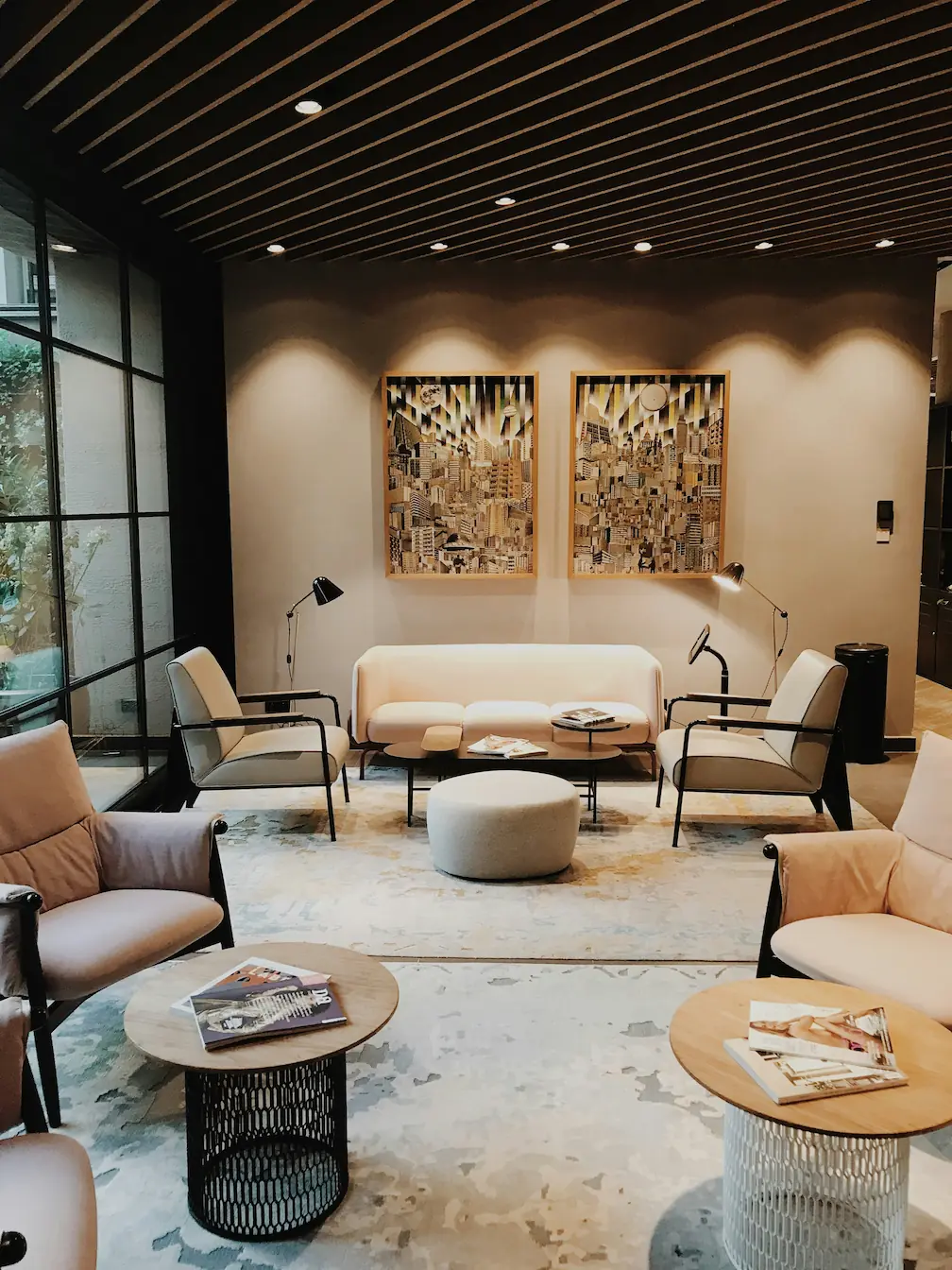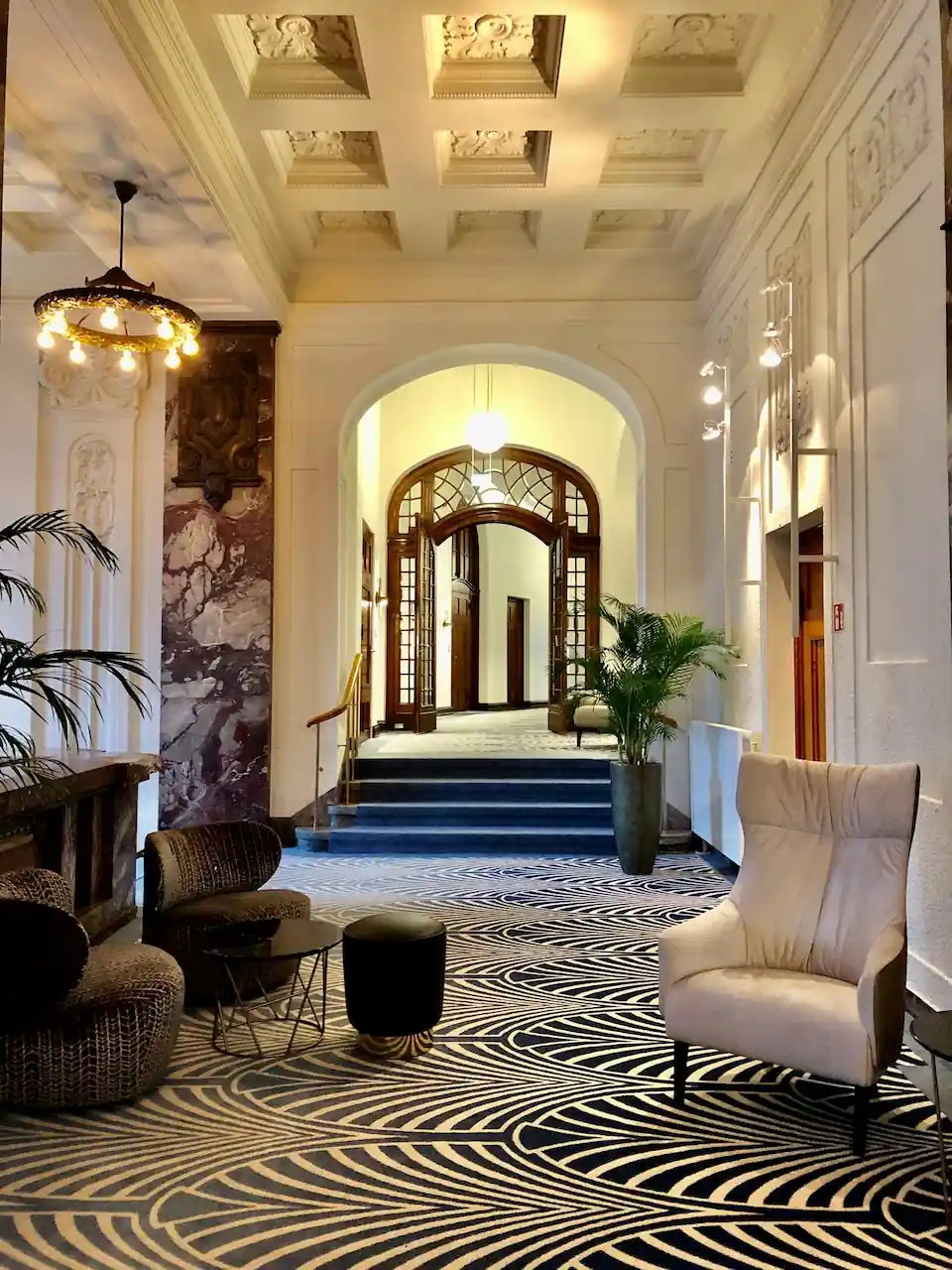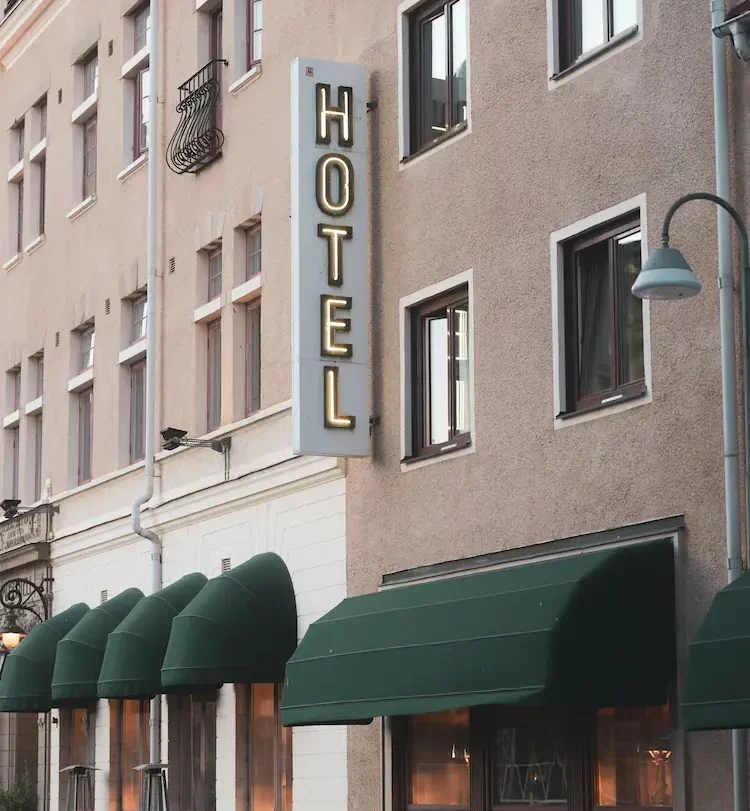From booking to business strategy - the PMS features you're missing
Every hotel manager has experienced that night. Fully booked. VIP guests on site. And suddenly the computer at reception freezes. These kinds of problems aren't just frustrating - they're completely unnecessary.
Modern Property Management Systems (PMS) do much more than just manage room bookings. In fact, some of the most valuable features often go unused. Many hotels focus on basic tasks like check-in and room allocation, but there are smart tools that can streamline the entire operation.
In this guide, we'll walk you through PMS features that you may already have, but are not yet fully utilising. From AI-based pricing to automated guest service, these are not solutions for the future, but tools you can start benefiting from today.
Let's dive into the PMS features that can really give your hotel an edge.
Smarter hotel management - PMS features that can transform your business
- Simplify booking management and maximise revenue with smart pricing.
- Enhancing the guest experience through personalised service.
- Improving efficiency with data-driven insights.
1. Easy booking management
Booking management is not just about making it easy - it's about doing it right. PMS systems that are directly connected to online travel agencies (OTAs) ensure that room supply is always up-to-date across all platforms. This eliminates double bookings and gives hotels greater reach.
Updating availability in real time has a direct impact on revenue. When guests see accurate information about room availability, they are more likely to book. In addition, automated booking confirmations reduce guest uncertainty and build trust even before they arrive.
2. Data-driven revenue management
PMS systems are changing the way hotels do pricing by analysing demand and adjusting room rates in real time. With dynamic pricing solutions, hotels can maximise revenue by automatically adjusting prices according to market conditions.
Forecast-based tools further enhance strategies. By anticipating occupancy trends and events in the local area, hotels can adjust their marketing and optimise revenue. An intuitive revenue dashboard provides a quick overview of key metrics, allowing managers to make better decisions without having to dig through lengthy reports.
3. taking the guest experience to a new level
Technology plays a crucial role in the guest experience - something many hotels are not yet fully utilising. PMS systems with customisable guest profiles make it possible to automatically tailor services based on previous stays, preferences and special requests.
Another feature that enhances the experience is automated pre-arrival communication. Guests can receive messages with booking information, tips on attractions, payment links or special offers. Studies show that proactive pre-stay communication has a big impact on guest satisfaction.
4. more effective human resource management
Mobile-friendly interfaces for staff simplify work and improve communication. Receptionists, cleaning staff and technicians can receive real-time updates on room status, making it easier to coordinate cleaning and maintenance.
Faster information sharing also reduces the risk of misunderstandings and streamlines collaboration between different departments. In a fast-paced industry, this type of agile communication tool can make a big difference.
5. Powerful reporting and analysis
PMS systems offer advanced reporting capabilities that are crucial to hotels' long-term strategy. Detailed occupancy reports help hotels identify patterns and optimise their planning. Financial reports provide a clear picture of performance and make budgeting easier.
Beyond economics, market reports provide a broader picture of hotel industry trends. Understanding your competitive situation is crucial when it comes to promotions and investments. These reports are more than just numbers - they are tools for developing long-term strategies based on facts.
Want to find out even more about how PMS systems can boost your hotel? Check out our article on PMS benefits for hotels for even more insights on how to use the system to its full potential.
Guests today have higher expectations. Let us show you how we can take your business to the next level.
Before we go deeper into the features of PMS systems, it is worth mentioning some basic principles. Read our comprehensive guide on PMS systems. There you will find a solid foundation to build on.
Unique PMS features that transform hotel operations
- Customised guest profiles allow hotels to tailor services to each guest's preferences.
- Mobile-friendly systems give staff real-time updates and improve communication.
- Advanced tools are changing management strategies and creating smoother operations.
PMS systems have evolved far beyond booking and payment. They now act as central hubs that connect the guest experience with the hotel's internal processes and flows. Here we explore how specific PMS features create a more efficient and personalised hotel experience.
Tools for a personalised guest experience
Personalisation is the key to guest satisfaction. It's not just about addressing guests by name, but about understanding and fulfilling their individual wishes throughout their stay. Here are some of the features that make this possible.
Customisable guest profiles
Customised guest profiles bring great benefits to the hospitality industry. By collecting and storing information about previous stays, preferences and behaviours, hotels can offer a more personalised service. This can range from favourite room temperature to specific food preferences. This type of insight helps hotels create a memorable and personalised experience for each guest.
Tailor-made recommendations
Recommendations based on guest data allow hotels to offer more than just standardised additional services. By analysing previous bookings and behavioural patterns, the system can suggest relevant services, such as a spa treatment or a guided tour. To avoid overwhelming the guest with choices, it is important to focus on the right offers at the right time.
Mobile-friendly systems for hotel staff
The hotel industry is in constant motion, literally. Staff are constantly on the move to help guests, and mobile-enabled systems make their work smoother. Here are some of the technological solutions that improve staff interaction.
Real-time room status
With real-time updates, staff can manage cleaning and maintenance much more efficiently. This means faster room turnarounds, allowing guests to check in earlier and have a better experience. By ensuring everyone in the team has access to the latest information, mistakes and unnecessary delays are minimised.
Instant messages for cleaning and servicing
Fast and clear communication between departments is essential for smooth hotel operations. PMS systems with notification features ensure that staff receive instant updates when a room is ready to be cleaned or when a guest has a specific request. This streamlines work and ensures that guests receive faster service.
Smoother communication between staff
Effective internal communication is crucial to keep things running smoothly. Mobile-based communication tools allow staff to send real-time updates, reducing the risk of misunderstandings. When the right person gets the right information at the right time, the workday is easier and service is better.
Modular Visit's platform streamlines staff workflows through task automation. The system can automatically generate tasks based on specific events. For example:
- If a guest books an extra bed, the cleaning staff is immediately tasked with placing it in the room.
- Additional services and upselling: when a guest orders additional services such as flowers or champagne in the room, the relevant details are automatically assigned to the staff responsible for preparing for the guest's arrival.
- Recurring tasks can be created automatically. For example, smoke alarms should be checked monthly or the lawn should be mowed weekly.
Tasks can also be marked as urgent to signal priority to the recipient.
5. Automated upselling opportunities
In the hospitality industry, strategic upselling can make a big difference to revenue. Through targeted offers, hotels can reach the right guests based on their booking history and preferences. These offers can be automated, meaning that guests receive personalised suggestions - something that not only increases revenue but also enhances the guest experience.
Already at the time of booking, upselling plays an important role. By offering room upgrades or special packages directly in the booking process, hotels can maximise their revenue. The key is to present these choices in an unobtrusive way so that it feels like an opportunity rather than a sales pitch. This way, the booking becomes not just a formality, but a chance for the guest to personalise their stay.
To ensure that these strategies deliver results, it is important to analyse revenue data. PMS systems with advanced analytics can track which promotions are performing best, allowing hotels to adjust their offers for the best possible impact. By using this information, hotel managers can make informed decisions and optimise their sales strategies.
6. In-depth analysis and reporting
Detailed occupancy reports are a cornerstone of effective hotel management. They provide a clear overview of how the business is performing - not only in terms of occupancy rates, but also through insights into guest behaviour, booking patterns and seasonal trends. This data helps hotels make informed decisions and plan for future growth.
Financial reports within PMS systems provide another layer of analysis. By collating data on revenue, expenditure and profitability, hotels get a holistic view of their financial situation. Advanced PMS solutions also offer customisable reports, making it easier to identify cost savings and spot revenue leaks.
Market analyses give hotels a broader understanding of the industry. Keeping track of market trends is crucial to adjusting prices and promotions in line with competition. By using this information, hotels can stay ahead of the game and quickly adapt to changing conditions.
7. integrated guest feedback
Collecting guest feedback is important, but it's how that feedback is used that makes the difference. The best PMS systems integrate feedback directly into the system, allowing hotels to act quickly. When guests leave reviews or make enquiries, the system can automatically follow up and ensure issues are dealt with without unnecessary delays.
Guest feedback is also invaluable for developing hotel operations. By analysing feedback, hotels can identify areas for improvement and adjust their services to better meet guests' expectations. Statistics show that one in four guests consider a quick response to feedback to be crucial to their overall experience. This shows the importance of having a smooth and efficient follow-up process.
Moreover, personalising services based on feedback creates stronger customer relationships. By actively using guest feedback, hotels can fine-tune their offerings and improve the guest experience.
8. dynamic pricing algorithms
Dynamic pricing has revolutionised the hotel industry. The system adjusts room rates in real time based on demand, seasonality and market conditions. By integrating these algorithms into the PMS, hotels can maximise their revenue opportunities. Using real-time data, the system can adjust prices quickly and smoothly to stay competitive.
Historical data also plays an important role. By analysing past trends, hotels can anticipate demand and adjust their strategies accordingly. This ability to stay ahead of the curve makes dynamic pricing an invaluable tool for revenue optimisation.
Want to learn more about how dynamic pricing can benefit your business? Read our comparison of PMS systems for a deeper understanding of how to best implement this technology.
9. advanced tools for channel managers
Channel management tools within PMS are essential for the smooth distribution of rooms. They help hotels automate room rate and availability updates across multiple booking channels simultaneously. This reduces the risk of double bookings and keeps rates consistent across all platforms.
Integration with external booking sites is another important feature. As the hospitality industry becomes increasingly digitalised, it is crucial that PMS systems can seamlessly connect with third-party platforms. This ensures that information is always accurate and up-to-date.
Want to know more about how to optimise your distribution strategy? Take a look at our guide on how to choose the right PMS system, where we look at how channel management can streamline your business.
1. the guest makes a booking via an OTA (e.g. Booking.com, Expedia)
- The guest searches for accommodation and chooses a hotel.
- The booking is confirmed by the OTA, and the guest receives a confirmation by email/SMS.
- The OTA sends the booking information to the PMS via the Channel Manager.
2. PMS receives the booking
- PMS updates availability in real time to avoid double bookings.
- The booking details are recorded in the system and synchronised with the hotel's internal data.
- Automatic rules can be activated (e.g. dynamic pricing, payment terms).
3. Guest arrival and check-in
- PMS generates a check-in request or reminder via email/SMS.
- The guest's data can be automated into the hotel's system (e.g. personalised preferences, payment details).
- Possibility of online check-in (if supported by PMS).
- The front desk will confirm the guest's arrival and provide the room key/code.
4. Guest stay and interactions
- Guest data can be used to create a personalised experience (e.g. preferred room temperature, minibar preferences).
- Any additional services (room service, spa, restaurant bookings) are recorded and managed by PMS.
- PMS updates the guest account in real time and collects billing data.
5. Check-out and payment
- Automatic check-out reminders are sent via PMS.
- Guests can check out online or at the reception.
- PMS compiles the invoice and synchronises the payment with the hotel's accounting system.
- If the payment was made via OTA (e.g. prepaid accommodation), PMS handles the accounting and any final invoicing.
6. After the stay - Guest feedback and follow-up
- PMS can automatically send a guest review request via email or SMS.
- The system can also trigger marketing actions (e.g. discount on next booking, loyalty programme).
- The OTA is updated with guest reviews and any feedback to the hotel.
7. update on availability and price for future bookings
- After check-out, the PMS releases the room and updates the availability in Channel Manager.
- Prices can be adjusted automatically based on occupancy and demand.
- New guests can now book the room via OTA or directly via the hotel website.
User tips to get the most out of the tools in PMS systems
- Seamless integration improves efficiency
- Continuous training strengthens staff competences
- Well-trained users make full use of the PMS system
7. maximise integration with third-party apps
CRM systems and PMS - a perfect match?
Linking PMS with a Customer Relationship Management (CRM) system can provide invaluable insights about guests. With such an integration, hotels can keep track of past bookings, preferences and feedback. This makes it easier to offer personalised experiences and improved service.
But this is not always a straightforward solution. Compatibility between CRM and PMS can be a challenge, and it is important to ensure that the systems work smoothly together. Some critics also argue that too much focus on data can lead to a loss of personalised contact with the guest. Therefore, it is important to weigh the pros and cons carefully before implementing an integration.
Modular Visit's platform is built with the aim of bringing together all of the organisation's systems in a single platform. Instead of several different integrated systems (with more or less success), the platform interacts as PMS, CRM, POS, WBE and channel manager. See more below on how it works.WBE PMS Self-service Dialogue Analyses POS
All online bookings are managed in the same platform as the PMS. A single true source for your data.
A powerful platform that combines your PMS, WBE, POS, CRM and channel manager. All systems and data in one place.
Checking in and out, making payments, updating information, adding extra services. Everything is easily managed by the guest.
Improve your guest communication. Information, reminders, suggestions for extra services and marketing. All easily automated in our powerful communication suite.
Reporting tools with great flexibility to create the reports and statistics you need.
Payments on site, online payments. Card, Swish, bank transfer, Apple Pay, etc. All included.
A platform.
For all systems.
Online booking in your PMS.
All online bookings are managed in the same platform as the PMS. A single true source for your data.
All in one place.
A powerful platform that combines your PMS, WBE, POS, CRM and channel manager. All systems and data in one place.
Let the guests help themselves.
Checking in and out, making payments, updating information, adding extra services. Everything is easily managed by the guest.
Communication that engages.
Improve your guest communication. Information, reminders, suggestions for extra services and marketing. All easily automated in our powerful communication suite.
Get insights from your data.
Reporting tools with great flexibility to create the reports and statistics you need.
All types of payments.
Payments on site, online payments. Card, Swish, bank transfer, Apple Pay, etc. All included.
Link to external booking engines
Integrating PMS with third-party booking engines makes the booking process smoother for both hotels and guests. This connection minimises the need for manual data management, reducing the risk of errors and saving time. Major players such as hotels.com and Booking.com need to be able to synchronise with the PMS system in real time to update rates and availability.
Stable two-way communication between systems is essential, but some PMSs may have problems with instant updates. In addition, not all booking engines work equally smoothly with all PMS systems, which can lead to double bookings or missed updates. Carefully selecting the right PMS and channel manager is therefore essential to ensure an optimal user experience.
Effective management of multiple sales channels
Manually managing multiple distribution channels can be time-consuming and inefficient. That's why integrated channel management tools are a great advantage. These tools synchronise room rates and availability in real time, reducing the risk of overbooking and rate conflicts.
Most modern PMS systems have some form of channel management functionality, but how well they work varies. The key is to find the right balance between having full control over distribution and adapting to the guidelines of each individual platform.
8. train staff to use the PMS effectively
Regular training
Regular training is key to ensuring that staff can really make the most of the PMS. As features evolve and are updated, it is important that everyone stays up to date. Scheduled training sessions ensure that staff are on the same level and can work effectively.
Different departments can benefit from customised training, tailored to their specific tasks. Mixing methods such as workshops, e-learning and interactive sessions can cater for different learning styles. Some question whether it is worth the cost, but fewer mistakes and better service clearly demonstrate the value of continuous training.
Practical training in a test environment
Just reading about PMS features is not enough - staff need to test them in real situations. Simulated test environments allow for practice without the risk of affecting real bookings or system settings.
By recreating common scenarios, staff can build confidence and be better prepared for any situation. Some may find it too time-consuming, but the long-term benefits of practical training outweigh the investment.
Want to compare the best PMS systems on the market? Read our analysis of leading PMS systems in 2024 to find the best option for your business.
10 pitfalls to avoid when choosing PMS.
Ensure that the PMS integrates seamlessly with your existing systems (e.g. CRM, accounting, booking platforms).
Ensure that the PMS integrates seamlessly with your existing systems (e.g. CRM, accounting, booking platforms).
Ensure that the PMS integrates seamlessly with your existing systems (e.g. CRM, accounting, booking platforms).
Ensure that the PMS integrates seamlessly with your existing systems (e.g. CRM, accounting, booking platforms).
Ensure that the PMS integrates seamlessly with your existing systems (e.g. CRM, accounting, booking platforms).
Ensure that the PMS integrates seamlessly with your existing systems (e.g. CRM, accounting, booking platforms).
Ensure that the PMS integrates seamlessly with your existing systems (e.g. CRM, accounting, booking platforms).
Ensure that the PMS integrates seamlessly with your existing systems (e.g. CRM, accounting, booking platforms).
Ensure that the PMS integrates seamlessly with your existing systems (e.g. CRM, accounting, booking platforms).
Delays and crashes can negatively impact both the guest experience and daily operations.
Further information on PMS systems
- Find the right PMS solution for your needs right away
- Keep up to date with the latest PMS developments
- Get to grips with tricky PMS terms
Choosing the right PMS system
Choosing the right Property Management System (PMS) is not easy given all the options available on the market. To make the right choice, it is important to understand the size and needs of the hotel. Smaller hotels and guesthouses can get by with simple PMS systems that handle basic functions. Larger establishments, on the other hand, need more sophisticated solutions with dynamic pricing and real-time analytics.
A careful comparison of the best PMS systems can help you find the right one. Check out our guide on PMS automations for an overview of the latest innovations.
The development of PMS technology
From its first versions to today's modern systems, PMS technology has undergone an impressive evolution. In the past, PMS systems were mainly offline and focused on scheduling, room allocation and billing. But with the move to cloud-based solutions, PMS has become more cost-effective, easier to update and simpler to integrate with other systems.
Cloud-based PMS solutions make it easier to connect the system with external apps, while offering better security and more efficient data storage. Thanks to real-time updates, hotels can manage their business without the delays that often occurred with older systems. Want to know more about why cloud-based PMS systems are so important today? Read our article on the benefits of cloud-based PMS.
The future of PMS technology points towards integrations with Artificial Intelligence (AI) and the Internet of Things (IoT). These features can improve automation, predictive maintenance and create an even more personalised guest experience. For the hospitality industry, this means new opportunities to streamline operations and meet guest expectations in an even more innovative way.
Read our guide PMS benefits for more information on the benefits of modern PMS.8 tips for choosing the right PMS
Choose a cloud-based PMS for better scalability, remote access and automatic updates.
Ensure that the PMS has seamless integration with OTAs and direct booking engines to maximise occupancy.
Look for dynamic pricing tools that adjust prices based on demand, season and competitor prices. Often this is an integration to an external platform.
Choose a PMS with CRM features to track guest preferences and increase repeat bookings.
A mobile-friendly PMS allows staff to manage operations from anywhere, increasing efficiency.
Advanced reporting tools help you track revenue, occupancy trends and profitability in real time.
Secure and smooth payment processing speeds up transactions and reduces the risk of errors.
Automate task distribution and get real-time updates to improve turnaround times.
Conclusion
The capabilities of modern Property Management Systems (PMS) are changing the way hotels run their business. From seamless booking management to advanced data analysis, these tools have become indispensable to the hospitality industry. But the real power lies in how you connect and automate the functions to create a seamless and efficient operation.
Think about how you use your current PMS system. Are you utilising the mobile platform for real-time updates? Have you enabled automated upselling at check-in? Each feature we've covered is part of a bigger picture. When put together properly, they create a smoother and more profitable hotel business.
Start by implementing a new feature. Make sure staff are properly trained on each new feature before moving on to the next. The key is to take it step by step instead of trying to change everything at once. Your PMS is only as effective as those who use it.
Remember that technology is there to help people - not the other way round. Use PMS features to create better guest experiences and give your staff the tools they need to make their jobs easier. The future of hotel management is already here - it's systematic, data-driven and guest-centric. The next step is to review your current PMS system and identify whether it really covers the functions expected today.







